Former World of Warcraft Dev Mark Kern Responds To Rumors of Blizzard Turmoil: “The Attitude Described About Monetization, How Devs View Gamers, And Hate Of Streamers Is True Overall In AAA Dev”
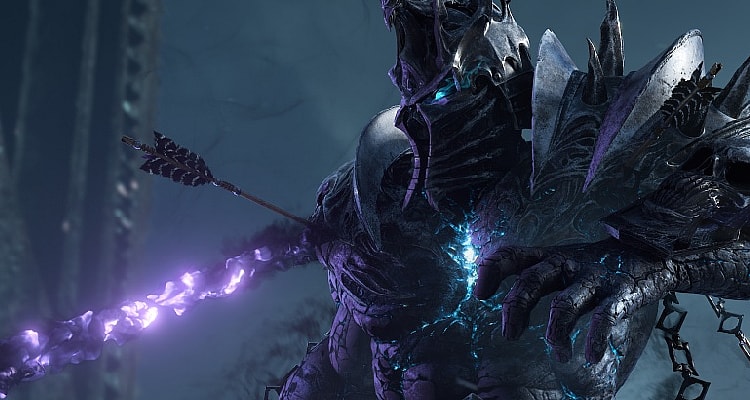
In response to rumors that Blizzard is currently bleeding players and struggling to retain interest in their titles, Em8er developer and original World of Warcraft team lead Mark Kern recently offered his opinion on the unconfirmed claims, asserting “It may not be legit, but the attitude described about monetization and how devs view gamers, and hate of streamers is true overall in AAA dev.”

The rumors surrounding the once-esteemed video game developer first appeared online on July 11th when an anonymous 4chan user claiming to be a Blizzard employee took to the site’s /v/ board to “vent” on the current state of the company.
According to the user, almost every product in the company’s library is suffering to some extent. For example, the latest WoW expansion, Shadowlands is reportedly “a s–tshow” with “no solid direction” which “no higher up expected […] because of their ‘we are too big to fail, if we build it they will come’ mentality”.
To that end, the user also stated that “the elephant in the room is FFXIV,” as the people in charge “don’t even seem to understand why it’s drawing players away in their tens of thousands.”
“[The higher ups] just seem so pig headed and digging their heels in with their fingers in their ears thinking all the problems will go away because WoW is ‘too big to fail’, there will never be real competition and ‘they will keep coming back,’” explained the user. “But they aren’t coming back anymore. Not in the numbers they used to.”

Noting that “the mood in the company is tense but also very much ‘it’s just a rough transition period’,” the supposed employee offered a grim vision of Blizzard’s future, detailing how “Activision has been pushing hard for Blizzard to release more regular product and to generate more income per user,” which as far as they know, will involve “a transition over the next 5 years to a much larger mobile/tablet gaming focus.”
“By all accounts not just WoW but Overwatch was intended to be the moneymaker in the interim but once again someone had the bright idea to kill a game casual players loved on the alter of e-sports hoping for another Brood War,” they added. “From what I hear the ‘told you so’s’ were loud and a lot of people walked beyond [Jeff] Kaplan.”

It’s apparently not just the games either, but also the studio’s reputation, as Blizzard is now allegedly seen as “‘the bad guy’ of the mmo industry.”
This newfound notoriety has supposedly had an effect on Blizzard’s hiring practices, as the user revealed that this new position as an industry heel “has also made [the total number of] new hires decline.”
“Not significantly, but the ‘you WANT Blizzard on your resume’ line doesn’t seem to have the appeal it used to,” the user continued. “This has lead to more hiring via friend of a friend, to some rumblings about nepotism, and people [being hired who are] severely lacking in experience ‘because they get great twitter optics.”
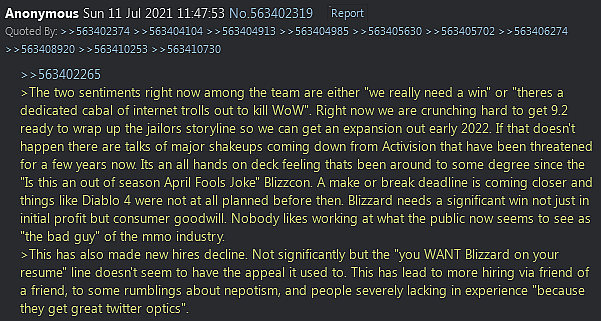
Another issue touched upon by the user was how employees “are not being told to ‘disengage’ from” Twitter, with an apparent “email reminder” being sent out “more than once lately stating ‘if you are not customer relations you should not be representing the company to customers, especially if you cannot remain professional.’”
Furthermore, the user also claimed that some at Blizzard view the connection between the devs and its player base “as some kind of antagonistic relationship where the goal is not being an entertainer putting on a show for a crowd but some kind of game hunter trying to trap a large, profitable kill.”

The supposed employee did touch on “the topic of ‘wokeness’” in regards to Blizzard’s troubles, admitting that while “it’s not all some grand sjw conspiracy, people really do want people to feel welcome and represented,” the “‘we need everything veto’d by people not working on it to see if its inoffensive and bland enough rubs some of us the wrong way.”
“There has been some drop offs with ‘go woke go broke’ as the only answer in the survey when unsubbing,” they added, “but honestly we are losing subs in unforeseen numbers anyway and still making more money than ever through cash shop ‘heavy users’ so it honestly doesn’t make an impact.”
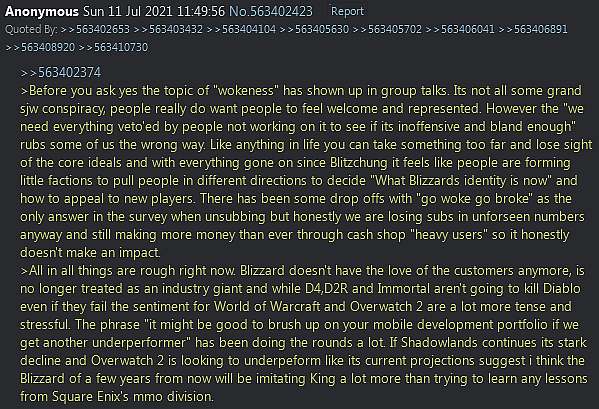
Two days after their initial posting, the above rumors caught the attention of Kern, who took to his personal Twitter account to discuss how, while the specific anecdotes themselves “may not be legit,” the “attitude described about monetization and how devs view gamers, and hate of streamers is true overall in AAA dev.”

Kern went on to expound on “a couple things [that] happened in AAA dev that lead up to this point,” starting with the unsurprising fact that “the biggest thing is money.”
“Once AAA gaming got bigger than all media, you start to attract a lot of execs who are in it for the immense profit vs the love of making games,” said Kern. “This change starts at the top, and is made worse by game companies going public.”

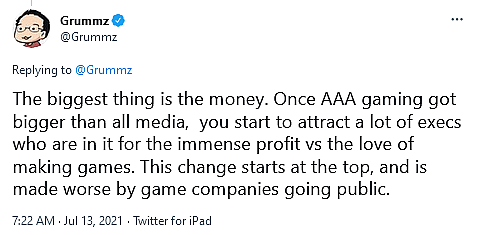
He continued, “This starts to flow down to middle management, who are starting to make serious cash.”
“The ‘why’ of a company changes. Instead of going for games they would love to play and identifying as gamers themselves, there is now a sense of ‘other,’” Kern remarked. “WE made the games, THEY pay for them.”
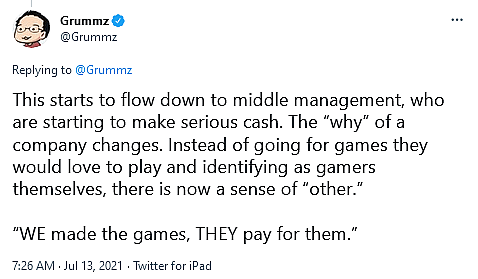
Recalling how “OG Blizzard culture used to be “We are gamers, right down to the receptionist, and we make game for ourselves because we are gamers,’” he lamented, “That is gone now, and devs at many AAA studios are distinctly US vs THEM (the ‘whiny, entitled gamers’).”
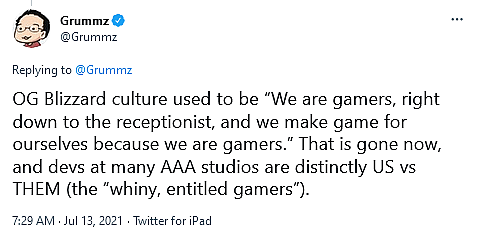
“This was not helped by the increase in personal attacks on devs by gamers themselves,” he observed. “Gamers are passionate, and unfortunately this sometimes moves beyond criticizing the game, to personal attacks and some really unsavory and threatening behaviors.”
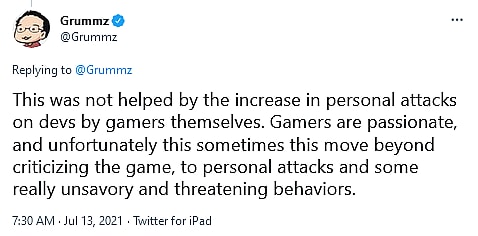
Turning “back to the money”, Kern further noted, “once games were obvious money makers, and EVERYONE started to play them, and a ‘cool’ rep, you started to attract a different type of developer.”

“The first wave did it for free, made very little money, very little success, just to make dreams happen,” said Kern. “But once games were viewed as a stable(myth) and more glamour “Career choice” with good pay, you started to attract the types of professional who are very good at their job, but are definitely what I call the Nine to Fivers. They treat it not as a passion, but as a routine job.”
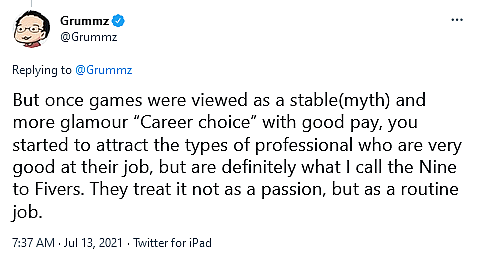
The developer then reminded his followers that “again, this wasn’t helped by upper mgt, who by now is fully flooded with MBA and Marketing types, who treat devs poorly and binge hire and fire them from project to project, treating them as tools,” adding that it’s “hard to have passion when both mgt and angry gamers don’t have your back.”

However, a major turning point in the industry culture apparently came when “Zynga blew up on Facebook, and metrics were becoming important along with predatory monetization.”
“When mobile exploded and everything become ‘free but with pay2win’ the sheer scale of gaming profits leapt an order of magnitude or two forwards,” wrote Kern. “Billions…not millions.”

As such, “Suddenly, making games for games sake was not the goal,” but instead “now games needed to collect metrics, retain users, and the way success was judged was more about how much money per user you could make vs having a great game.”

“The focus moved from gameplay to monetization metrics,” Kern asserted. “When you design for monetization metrics, you get a very different type of game than if you design for gameplay. The two are often at odds. You find yourself deliberately making your game worse so it can sell better convenience items and power items.”

Linking to an old interview given by Apple co-founder Steve Jobs to Designer’s Digest, Kern declared “Steve Jobs was right. When you let this type of ‘why’ drive your company, and you make monetization the only goal, you kill the innovation in your company and you drive out the innovators and makers.”

“While Jobs was talking about sales and marketing staff vs product makers, in games it’s worse,” clarified Kern. “In games, designers are now the sales staff. The gamification of monetization makes or breaks a AAA game. So now, even your product people are contaminated with this mentality.”

As for “the devs who do it for the passion, who are tired of being blamed by gamers for corporate decisions above them, and who do it out of genuine passion,” Kern ascertained, “well they leave and go indie,” and thus “what remains are those who are doing it as a job. One they often hate, and they are not innovators.”
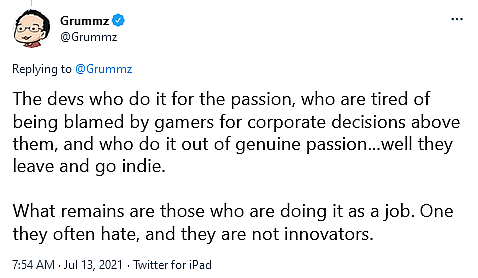
“The arrogance is also real,” added the em8er developer. “Steve talks about how you get surprised, because you have a monopoly on the market. WoW had that monopoly on MMOs. And they are no longer gamers but game salespeople. So of course they are prone to disruption.”
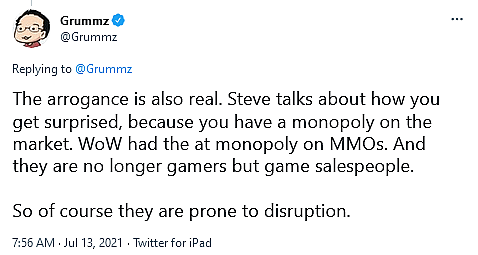
Moving to address the subject of Final Fantasy XIV, Kern stated, “In this case, it wasn’t Square and Final Fantasy BY ITSELF. That just happened to be a game that was competing on gameplay instead of monetization because they were NOT the monopoly.
“It’s also an old enough game where the old values of gameplay were more important,” he reasoned. “What sparked the exodus from wow started with a player base that was tired of being treated as customers are often treated in a monopoly (taken for granted, poor service in terms of content, not being listened to, milked for cash and fees). “

Kern next spoke to how “Streamers are the world’s BIGGEST force in game marketing,” arguing that “they can make you a success overnight with ZERO trad marketing (APEX Legends), or they can absolutely tear your game down.”

“Many in traditional AAA game marketing never understood this, and many still don’t get it today,” continued Kern. “When streamers were just getting started, I was told by my EA and AAA staffed marketing team what a WASTE it was to do YouTube and Twitch (even though it cost a fraction of ad spend).”
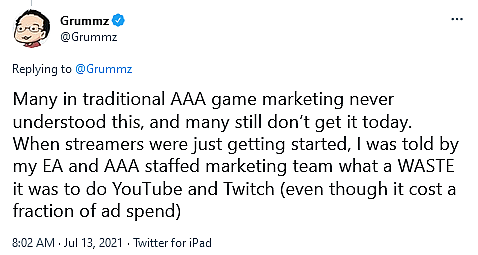
“Of course, they were wrong, and they now curry favor and spend money on twitch and YouTube. But they don’t really UNDERSTAND it. They spend money on it, but they don’t actually watch the streams to understand when things are going wrong. Or they don’t believe it will affect them,” he tweeted.

Pointing to the recent stream held by streamer Asmongold in which the popular WoW player tried out Final Fantasy XIV, Kern described how “when Asmongold started dipping his toes into alternatives to WoW, interviewing Final Fantasy content creators and then, finally, playing it himself on stream, Blizzard was unaware or unbelieving of what was happening. THEY were the monopoly.”
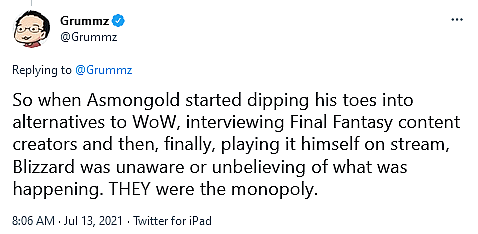
“Even Asmongold was taken by shock at the sheer number of viewers his Final Fantasy stream attracted,” said Kern. “Even he had underestimated the number of dissatisfied and curious for alternative WoW gamers.”
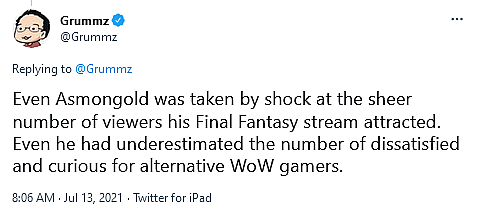
Asking “Well what happens in streaming?”, the dev went on to explain, “Once ONE content creator hits a gold vein of views, OTHERS quickly hop on. Suddenly you have many WoW streamers talking about Final Fantasy and starting to stream it.”

“What’s a WoW gamer to think?” he asked in follow-up. “The rest is history. The King is dethroned, an expression of shock on his face. Sometimes you don’t need the best product. You just need to be good enough to take advantage of a company that has rested too long on their brand and monopoly to actually change, innovate and improve.”

Nearing the end of his thread, Kern warned that “This won’t stop. WoW gamers are leaving for good,” whilst simultaneously advising Blizzard to “wake up and pull an expansion out as a turnaround as drastic as Square itself did with A Realm Reborn” if it had wanted to have any hope of being able to “flip it around again.”
“The problem is Blizzard, you chased all your innovators away,” he concluded. “Oh well.”

What do you make of Kern’s take on the AAA gaming industry? Let us know your thoughts on social media or in the comments down below!
